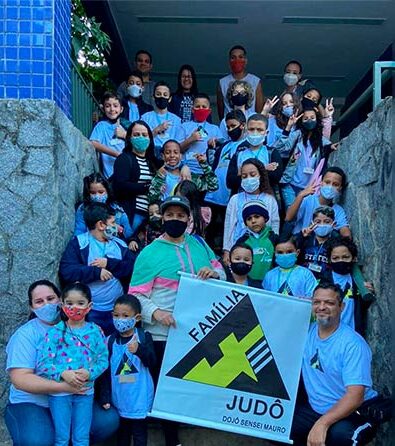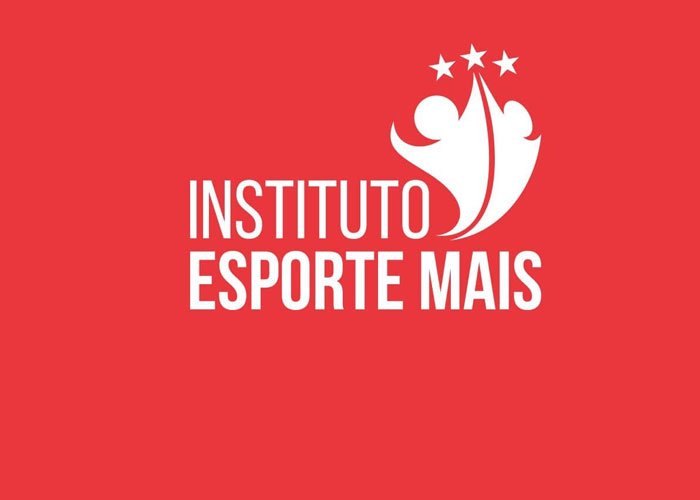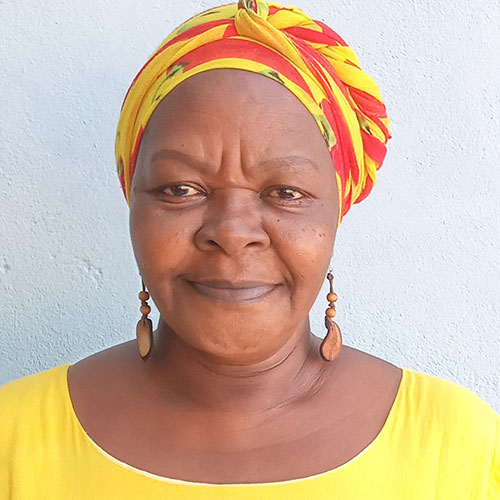Judo sociocultural project aims to take young people from Rocinha to the Los Angeles Olympics
The project's main focus is teaching Judo to children, young people and adults, as well as carrying out cultural tours with students.


The “Família Judô Renasce Rocinha” project, based in Laboriaux, located at the top of the Rocinha favela, in the South Zone of Rio de Janeiro, has as its main focus teaching Judo to children, youth and adults – in addition to carrying out cultural tours with students. The action has changed the lives of many people around here.
Its founder is Mauro Souza, 53 years old, he is a 3rd Dan sensei*, graduated in 1995 by the Rio de Janeiro Judo Federation and the Brazilian Judo Confederation. Mauro is also currently enrolled in the National Judo League of the State of Rio de Janeiro, the Rio de Judo Confederation and the Judo League of the State of Rio de Janeiro.
In an interview, Mauro told me about the project he is working on with his family and what inspired the name of the project. See more details below!
Neuza Nascimento: What is the Família Judô Renasce Rocinha?
Mauro: It is a project that my wife, Bianca Martins, and I founded in which we conduct judo classes, tours and visits to Cultural Centers and leisure institutions, lend books from our small library, and deliver food handouts to the students’ families in need – which are passed on to us through other partner institutions such as the NGO Rocinha Alerta and Associação de Cultura, Arte e Esporte da Rocinha.
Neuza Nascimento: Why does the project have the term “Familia” in its name?
Mauro: Because my wife and I built the project together, with the support of our daughter, who is also a student.
Neuza Nascimento: And going back a little bit, how and when did the project start?
Mauro: We started the project in a space provided by the Rocinha Residents Association, in 2019. For various reasons, we had to leave, and we had no space to work. But we knew we had to go ahead, as all the students followed us. So, the father of two students became sensitive to the situation and lent us his balcony to continue the project. Soon after, the pandemic came, and we had to paralyse everything. As I had paid leave from my job, I took advantage and invested my time in building a small independent space on the slab of my house and, where two rooms were going to be built to enlarge the house, is now where the classes take place.
Neuza Nascimento: What are the goals of the project?
Mauro: Bringing the Olympic sport to those who are unable to afford academies’ fees; prepare athletes for a future transfer to larger competition teams, aiming for them to have a bright future; give children the opportunity to broaden their horizons outside the community, through visits to cultural and leisure spaces; encourage the habit of reading by lending books. All this, always with the aim of improving the quality of life of all participants.


Neuza Nascimento: What motivated you to create this project?
Mauro: First, we like judo. But what motivated us the most was the fact that here in Rocinha there are hundreds of Jiu-Jitsu academies, but only three for Judo. The lack of this art here bothered me, so I wanted people who were interested in learning this sport to have an opportunity. As I am a Judo teacher, why not offer? And, as I don’t pay extra rent to keep a space for classes, like in a traditional gym, why not do a social project focused on judo? That’s what motivated me.
Neuza Nascimento: How many beneficiaries does the project currently have? And what age group are they?
Mauro: Today we have 39 athletes, and the age group ranges from 3 to 34 years old.
Lupa do Bem: What are the criteria for a student to join the project?
Mauro: First, being interested in learning judo. After that the person is invited to watch a class. If they like, they just bring the necessary documentation, according to their age, and they can start.
Neuza Nascimento: Is there a support team? If so, is it paid?
Mauro: Yes, there are four of us. I am the Coordinator and Professor in charge. I coordinate, minister and guide classes, plan events, lectures, and competitions; Bianca, green belt, monitors and coordinates the administrative, communication and sociocultural aspects; Ivan Cândido, brown belt, Instructor, helps and teaches children and youth groups, he is also coach of the competitions team; and my daughter is in support. All of us are volunteers, but the instructor receives R$100 a month as an allowance. This amount is deposited by me in a savings account and is intended so that, when the time comes, he can pay for the black belt exam, as it is expensive for his possessions. This money is obtained through the monthly contributions of students who can contribute financially. Sometimes the students contribute with R$30 or R$5, but those who cannot pay don’t pay anything. The rest of what is collected is used to buy snacks for the children, which is served at the end of each class; buy hygiene and cleaning supplies, printer ink and other items that are necessary on a daily basis.
Neuza Nascimento: What are your biggest challenges?
Mauro: The biggest challenge was to build this space, which is not ready yet and another challenge, still, is to keep children and young people committed to the project.
Neuza Nascimento: And victories?
Mauro: The biggest victory for me is the success of the project within the community. The more students come in and stay focused on the martial art, the happier I am. We teach the oriental discipline, which is to respect the elders, there is a hierarchy, even among them, this hierarchy is according to the colours of the belts. This they will take for a lifetime. But just seeing the gym full, to me, is a victory itself. I started with six students and today I have almost 40. This is a victory. It means that the project was well accepted. It is also a victory when I see that the students are learning everything that is passed on to them. Seeing the sports and social evolution of the student is very gratifying.
Neuza Nascimento: How does the student’s development occur through the belts?
Mauro: It starts with the white belt, goes to grey and then comes: blue, yellow, orange, green, purple, brown and black. Judo as a whole has other colours, but in Renascer we only go to black.
Neuza Nascimento: What are the project needs in general?
Mauro: One of the most urgent needs is to cover the slab, to reinforce it, because when it rains it interferes a little with the classes. At the peak of the pandemic my boss gave me paid leave, my wife and I both worked, so I took advantage of the time I stayed at home and used part of my salary and built this dojo slowly. But there are still many things missing. We need to put windows, mats, and it is necessary to make a small cover where parents are waiting for the end of classes. We also need judoguis (training uniform), snacks for students and items to compose the food handouts to continue supporting parents and encouraging family members to bring their children. Another need for the project is financial resources to cover expenses, such as annual registration of athletes in the Judo League and transportation to sporting or cultural events. The money raised from the monthly fees doesn’t quite cover all of that.
Neuza Nascimento: Did you manage to continue in action during the peak of the pandemic?
Mauro: We stopped in March 2020, which was the peak, that’s when I started the work. We returned in August, with a limited number of students, complying with safety regulations. We were fundamental in that period. We managed to teach classes and continued to distribute food handouts, as our support to the families was very important at that time.
Neuza Nascimento: Any expectations for the future?
Mauro: We are designing a project for the Los Angeles Olympics, I want to graduate at least one. If I manage to, I’m already satisfied. Not for me, this is just the embryo, the idea is to take and present them to a big club, and from there they go into the world. If I get one of them there, I’ll consider it my life’s work. If I can get more than one, even better.
Neuza Nascimento: Would you like to add any more information?
Mauro: Not only martial arts, but I think that sport in general should be open to all children, especially children in the community, who are so excluded. This takes the focus away from the street, from doing nothing. Here they are busy. Judo is not just a martial art. Its creator, Jigoro Kano always said that judo is more than a fight, it’s a philosophy. Because it is an Olympic sport, it is very expensive to maintain this modality, classes are expensive, clothes are expensive. 90% of students use the project’s own Kimonos, which are borrowed until they can buy their own.
Testimonials from students and relatives:
“After Arthur joined the project, he improved a lot. He is a more active child, and as he couldn’t go to school, he was always at home watching TV or on his cell phone. As he is an only child, he was always standing still”- Maria José Soares, grandmother of 8-year-old student Arthur Soares.
“Judo represents almost everything to me. I feel at home, it’s like a family. Judo has changed my physical and mental health. It has helped me at school, because I was very withdrawn and didn’t talk to people, and with judo I started to loosen up and make new friends.” – Aline, student, 13 years old.
“Judo is a type of attack and defence, both on the street and in the dojo. It teaches respect for parents and to be elegant inside and outside the dojo. I used to fight a lot at school, after I started doing Judo, everything changed.” – Maria Clara, student, 11 years old.
*(Sensei is a term used as an honourable title to treat a teacher or master within Judo with respect)
Did you like the project?
To donate materials, contact: maurex1313@yahoo.com.br
To contribute: Pix (21) 992716746
Facebook: Family Renasce Rocinha





